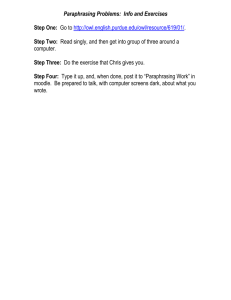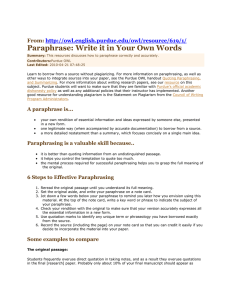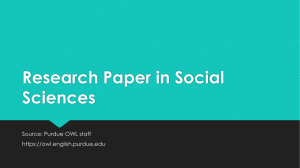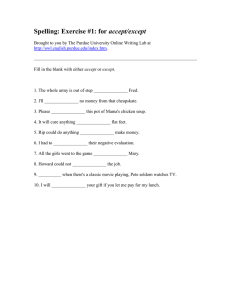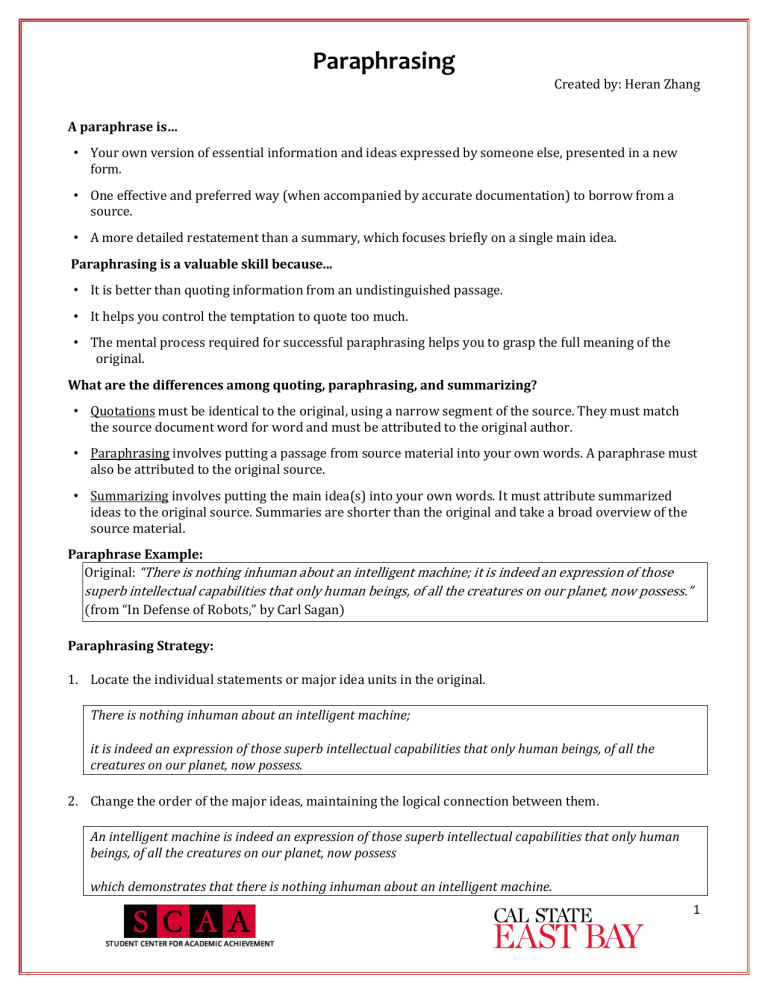
Paraphrasing Created by: Heran Zhang A paraphrase is… • Your own version of essential information and ideas expressed by someone else, presented in a new form. • One effective and preferred way (when accompanied by accurate documentation) to borrow from a source. • A more detailed restatement than a summary, which focuses briefly on a single main idea. Paraphrasing is a valuable skill because... • It is better than quoting information from an undistinguished passage. • It helps you control the temptation to quote too much. • The mental process required for successful paraphrasing helps you to grasp the full meaning of the original. What are the differences among quoting, paraphrasing, and summarizing? • Quotations must be identical to the original, using a narrow segment of the source. They must match the source document word for word and must be attributed to the original author. • Paraphrasing involves putting a passage from source material into your own words. A paraphrase must also be attributed to the original source. • Summarizing involves putting the main idea(s) into your own words. It must attribute summarized ideas to the original source. Summaries are shorter than the original and take a broad overview of the source material. Paraphrase Example: Original: “There is nothing inhuman about an intelligent machine; it is indeed an expression of those superb intellectual capabilities that only human beings, of all the creatures on our planet, now possess.” (from “In Defense of Robots,” by Carl Sagan) Paraphrasing Strategy: 1. Locate the individual statements or major idea units in the original. There is nothing inhuman about an intelligent machine; it is indeed an expression of those superb intellectual capabilities that only human beings, of all the creatures on our planet, now possess. 2. Change the order of the major ideas, maintaining the logical connection between them. An intelligent machine is indeed an expression of those superb intellectual capabilities that only human beings, of all the creatures on our planet, now possess which demonstrates that there is nothing inhuman about an intelligent machine. 1 Paraphrasing Created by: Heran Zhang 3. Substitute synonyms for words in the original. Consider changing negative statements to positive assertions, passive verbs to active (or vice versa). Since artificial intelligence results from human beings’ unique intellectual talents, the technology should not be regarded as inhuman. 4. Combine or divide sentences as necessary. Artificial intelligence results from human beings’ unique intellectual talents. Thus, the technology should not be regarded as inhuman. 5. Compare the paraphrase with the original. 6. Weave the paraphrase into your essay. 7. Document the paraphrase with in-text citation. (Also include it on Works Cited page) Artificial intelligence results from human beings’ unique intellectual talents. Thus, the technology should not be regarded as inhuman (Sagan 234). Some paraphrasing examples to compare The original passage: Students frequently overuse direct quotation in taking notes, and as a result they overuse quotations in the final [research] paper. Probably only about 10% of your final manuscript should appear as directly quoted matter. Therefore, you should strive to limit the amount of exact transcribing of source materials while taking notes. Lester, James D. Writing Research Papers. 2nd ed. (1976): 46-47. A legitimate paraphrase: In research papers students often quote excessively, failing to keep quoted material down to a desirable level. Since the problem usually originates during note taking, it is essential to minimize the material recorded verbatim (Lester 46-47). An acceptable summary: Students should take just a few notes in direct quotation from sources to help minimize the amount of quoted material in a research paper (Lester 46-47). A plagiarized version: Students often use too many direct quotations when they take notes, resulting in too many of them in the final research paper. In fact, probably only about 10% of the final copy should consist of directly quoted material. So it is important to limit the amount of source material copied while taking notes. 2 Paraphrasing Created by: Heran Zhang Paraphrasing Exercise (The answers are on the next page.) Directions: Write a paraphrase of each of the following sentences or passages. 1. The student requested that the professor excuses her absence, but the professor refused. 2. International Center is hosting English Conversation classes. They help non-native speakers of English practice their English speaking skills. 3. The car that was pulled over by the police officer yesterday just had an accident. That driver is not careful. 4. Of the more than 1000 bicycling deaths each year, three-fourths are caused by head injuries. Half of those killed are school-age children. One study concluded that wearing a bike helmet can reduce the risk of head injury by 85 percent. In an accident, a bike helmet absorbs the shock and cushions the head. From "Bike Helmets: Unused Lifesavers," Consumer Reports (May 1990): 348. 5. "The Antarctic is the vast source of cold on our planet, just as the sun is the source of our heat, and it exerts tremendous control on our climate," [Jacques] Cousteau told the camera. "The cold ocean water around Antarctica flows north to mix with warmer water from the tropics, and its upwellings help to cool both the surface water and our atmosphere. Yet the fragility of this regulating system is now threatened by human activity." From "Captain Cousteau," Audubon (May 1990):17. 3 Paraphrasing Created by: Heran Zhang Paraphrasing Exercise: Possible Answers 1. The professor denied the student’s request for an excused absence. 2. English non-native speakers can improve their English by taking classes at International Center. 3. The careless driver who was pulled over yesterday just got into an accident. 3. The use of a helmet is the key to reducing bicycling fatalities, which are due to head injuries 75% of the time. By cushioning the head upon impact, a helmet can reduce accidental injury by as much as 85%, saving the lives of hundreds of victims annually, half of whom are school children ("Bike Helmets" 348). 5. According to Jacques Cousteau, the activity of people in Antarctica is jeopardizing a delicate natural mechanism that controls the earth's climate. He fears that human activity could interfere with the balance between the sun, the source of the earth's heat, and the important source of cold from Antarctic waters that flow north and cool the oceans and atmosphere ("Captain Cousteau" 17). -Works Cited Purdue OWL. “Paraphrase: Write It in Your Own Words”, The Purdue OWL, Purdue U Writing Lab, 30 June 2016. owl.english.purdue.edu/owl/resource/619/01/. Purdue OWL. “Paraphrasing Exercise”, The Purdue OWL, Purdue U Writing Lab, 21 April 2010. owl.english.purdue.edu/owl/resource/619/02/. Purdue OWL. “Paraphrasing Exercise: Possible Answers”, The Purdue OWL, Purdue U Writing Lab, 21 April 2010. owl.english.purdue.edu/owl/resource/619/03/. “Strategy” is adapted by Professor Sally Baxter from Kennedy, M. L. and H.M. Smith. Reading and Writing in the Academic Community. Upper Saddle River: Prentice Hall, 2006, pages 66-73. 4
